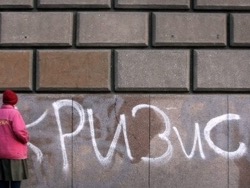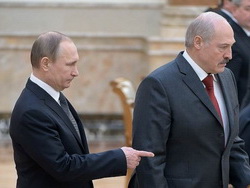
Criticism and excessive use of black and white colors have always been unacceptable for an objective assessment of what is happening in the economy. However, in the Belarusian information space is this good enough therefore to refrain from exploring such a condition as depression, is very difficult. Finding a way out of the eternal circle of samsara, contemplate the flame of a candle, and even tea with chamomile and raspberry jam is unlikely to help. Although absolutely always overly pessimistic forecasts of development of the situation in Belarus is far from reality and probably are fiction. However, today — with a certain difficulty, but still — we have to agree with the alarmists: the situation in the country is a stalemate. And this is a real threat to our national security.
The current crisis officially came to Belarus last year, when gross domestic product (GDP) of our country decreased by 3.9% for the first time since 1996. However, if you define the starting point of the crisis, it would be more correct to speak of the year 2009. It was a serious failure in the domestic economic system.
Thirteen years — from 1996 to 2008 — average annual economic growth in Belarus was at the level of 7.5%. The first eight years of this time period the country grew at the expense of the Soviet legacy in the form of production capacity, implemented on the territory of Belarus in the post-war period and due to the rapid expansion of Belarusian goods to the Russian market. The next five years — the so-called “fat years” — coincided with the rapid increase in oil prices on the world market. Since 2004 the price of a barrel of Brent crude oil increased from $30 to 140 by mid-2008. Although Belarus has limited reserves of its own oil, every year more than 20 million barrels of Russian “black gold” is processed at Belarusian refineries and sold abroad.
In 2009, the basis of socio-economic model of Belarus has been shaken. First, Russia temporarily abolished the discount for energy resources delivered to Belarus at discounted prices. Secondly, the global financial crisis has caused an overall decline in demand in foreign markets, which affected the exports of Belarus. The authorities attempted to artificially maintain economic growth. The result was a three-time devaluation and inflation is over 100% for FY 2011. In subsequent average annual growth rate of GDP already grew by only 1.4%. What he called “Belarusian economic miracle” evaporated.
In the current situation of traditional sources of growth have been replaced by debt instruments. The Belarusian authorities are less than 7 years increased the external debt of state administration bodies in 3,6 times: on 1 January 2009 they must have been creditors a relatively small $3.6 billion, by January 1, 2016, this amount increased to a significant $12.9 billion So far each year our country we have to give 4,7% of the manufactured product as payment for their earlier loans, although earlier the figure was less than 0.5%. Thus, the money that could be used within the country for its development, now goes abroad to pay for the mistakes of the past.
However, return of external debts the country needs to borrow funds in foreign currency. With this we have a serious problem. The main source is exports in recent years has been depleted. If in 2014 Belarus earned $43.1 billion, last year income did not exceed $33.0 bn (down 23.4 per cent). The situation has become much worse in the first months of 2016 — the rate of decline of revenues from exports reached obscene levels.
It is not surprising that it has half the team from the government and the national Bank is trying to negotiate with the International monetary Fund (IMF) and other international creditors on the allocation of another portion of money for the country. In some cases we can come to an agreement, but in General the results are not encouraging. Moreover getting a regular loan means, like raising the retirement age temporarily relieves the suffering financial system, but the problem in the medium and long term, does not solve, and in some cases even makes things worse.
In an emergency order, the authorities resorted to a dangerous strategy of eating itself from within.
The reader who follows the news definitely noticed that the last few months, the Finance Ministry of Belarus is increasingly advertises currency bonds for individuals and businesses. such bonds Diverge as pies. Here only buy their loss-making state enterprises at the expense of their debts to domestic banks. In the end, on the one hand, nominally the banks ‘ balance sheets improve, as used by the financial sector standards assess the risk of non-repayment of money by the state, half are lower than the corresponding risk for any enterprise. But on the other hand, debt does not disappear, it just shifted from one pocket to another.

Metaphorically speaking, dirty clothes can be hidden in the closet before company comes. Then there also send unnecessary things, so do not lie under the feet. But doing it indefinitely is impossible: the closet door at some point may appear comical situation provided. Here only we have a different genre, and he is far from a Comedy.
To hide the “dirty” assets is possible, but to return the money. Compounding the situation is that the “purified” state-owned enterprises, despite the assistance of the Ministry of Finance, continue to generate huge debts. And money in the country will no longer be.
Published on the website of the Ministry of Finance the message that “international rating Agency “standard and poor’s” confirmed the long-term and short-term sovereign credit ratings of Belarus at “B-/”… the forecast of change of ratings — “stable”, “this background is not as optimistic as it might seem at first glance. After all, according to the classification in S&P, such rating unfavorable economic conditions may negatively affect the ability of States to pay their debts, therefore debt obligations have speculative character. It is not surprising that the Outlook on the rating is “stable”: the risks already are at the maximum allowable level. Next level — category “C” is not an acceptable rating for the country.
That another rating Agency — Moody’s — in early April lowered the country to pre-default status level “Saha”, and was later decided to keep silent. But this puts us in one number with such countries as Argentina, Tajikistan, Cyprus, Greece, Egypt, Pakistan, Ghana, which recently flashed in the news only as examples of bad economic decisions.
The eternal question “What to do?” against this background acquires a special status. And another question from this plane — “Who is guilty?” — you must leave out. The dialogue on the principle of blame is far too expensive — there is no time.
However, the development of solutions to overcome the crisis behind closed doors is no longer working. If in recent years the representatives of the official authorities are unable to find solutions in this regime, then why should it happen now? Therefore, the necessary openness and involvement in the process of seeking ideas from all interested persons. And without profanity and formalism.
If we fail to reach the openness of public authorities, then the probability of appearance of a dozen “great schemer” Ostap Bender — the advisors and consultants who know the “right way” to solve all the problems. In terms of opacity and obscurity “the parade”.
The worst thing is that all given in this article, soulless facts and figures hiding ordinary people — citizens of Belarus. And I wouldn’t want my country became a state, which was labeled “failed state”. Because then all of us will not be easy.
And it’s better I will be wrong, and I call the next critic, but to be silent in this situation is the wrong strategy.








